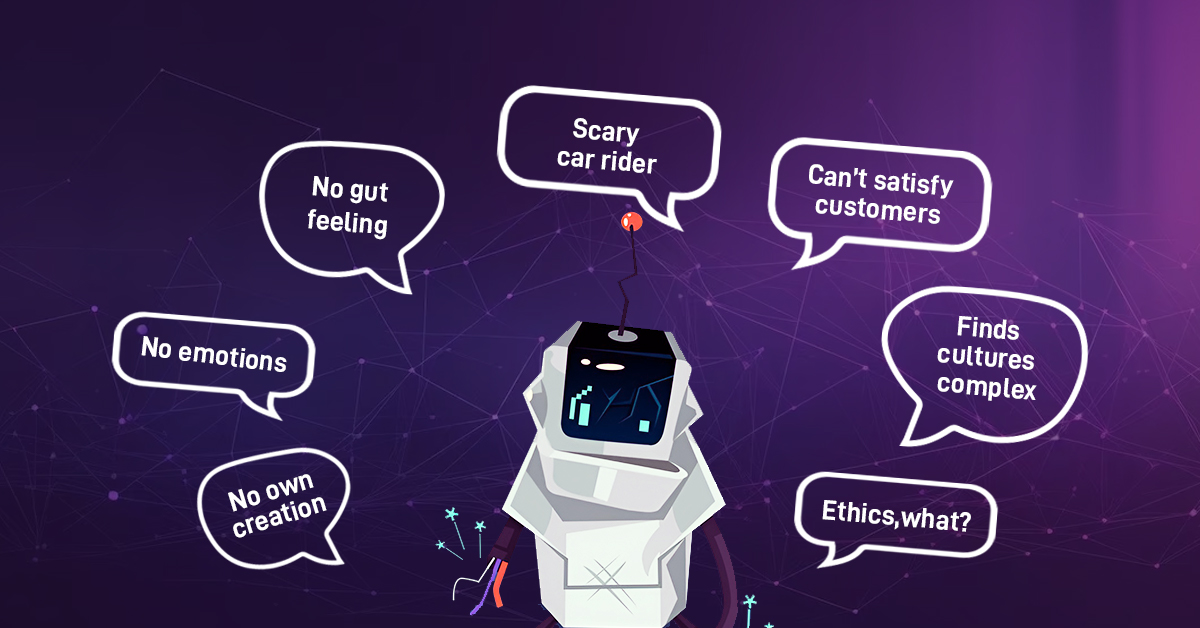Artificial Intelligence (AI) has become a buzzword in recent times. Also promises to revolutionize the way we live and work. AI offers many benefits to humans. But it’s important to recognize situations where the human touch is irreplaceable. In this blog, we will explore ten reasons why we don’t need AI in every aspect of our lives.
By knowing the value of human connection and the risks of artificial intelligence. We aim to shed light on the importance of balancing technology and the human experience.
AI cannot create something
AI is the leader in analyzing data and performing tasks based on pre-existing patterns. But it falls short when it comes to creativity and imagination. Our ability to think outside the box and come up with unique solutions to problems is what sets us apart. We (humans) bring originality and beauty to the world. It can be in any form such as art, literature, or invention. AI cannot create something on its own like us. It always takes the pre-existing content or design created by someone.
The real struggle to find the emotional string
Empathy is a powerful human trait. That allows us to understand and connect with others emotionally. While AI can only process information and provide solutions. It cannot understand human emotions and offer genuine empathy. Only humans bring warmth and understanding to our relationships. Such as comforting a friend and resolving conflicts among peers who are working from home.
During challenging times, we often seek emotional support and encouragement from loved ones. Only a human can provide comfort, understanding, and motivation.
No more gut feelings for AI
Sometimes, making decisions based on data and logical analysis may lead to errors. Our intuition and gut feelings are from experiences and emotions. Often guide us in making choices that go beyond what AI algorithms can provide. Trusting our instincts is essential in certain situations which need quick and intuitive decision-making.
Ethical consideration, what?
Another major disadvantage of AI is it operates based on algorithms and rules. This makes it incapable of making ethical judgments. Humans have the ability to feel ethical considerations. And consider moral suggestions and make choices that align with their values. It can be a medical decision or a complex societal issue. Our moral judgment shapes the world we live in. This quality of AI can sometimes be misleading and dangerous in a while.

Complex cultural interactions
This concept becomes clearer with the AI in the context of creating images. AI can understand our requests to a certain extent. Let’s say you want a picture of a traditional girl celebrating a cultural festival. AI might give you a picture if it’s a well-known festival, but it won’t be a perfect match.
When humans visit these festivals, they experience them firsthand. And capture moments that result in beautiful pictures. These pictures leave a lasting impression on people’s minds.
AI has its limits when it comes to understanding the depth of cultural experiences. Where humans can provide through their interactions and firsthand experiences. This is one reason why AI may not always be necessary.
Chatbot Limitations in Customer Satisfaction
AI-powered chatbots can fail to answer precise questions. Especially when they encounter specific queries that were not programmed.
In a scenario where the customer is inquiring about a specific chemical ingredient. Let us take triclosan in a hair care shampoo. The chatbot may struggle if it is not trained to recognize chemical names.
This limitation of AI chatbots can be a drawback compared to human customer support. Humans have the ability to understand context. Then they apply critical thinking and adapt to novel situations.
When faced with an unfamiliar question, a human customer support agent can follow up with clarifying questions. Even research the topic if necessary, and provide a personalized and accurate response. But AI cannot do any clarification like humans.
AI's driving limitations
AI in autonomous vehicles automates driving tasks, making transportation safer and more efficient. Yet, there are moments when human intervention is crucial for avoiding accidents. Take Tesla, for instance, which faced 273 crashes involving its vehicles. These incidents serve as a clear example of AI’s limitations.
AI can handle routine driving quite well. But it struggles in unexpected situations like adverse weather or complex scenarios. The risk of AI is in these critical moments. But human drivers excel at making split-second decisions to prevent accidents.
Moreover, human values and ethical considerations come into play when accidents are unavoidable. Human involvement remains essential to ensure safe and responsible autonomous driving.
The most profound reason we don’t need AI in every aspect of our lives. Is that being human is a unique and distinctive experience.








